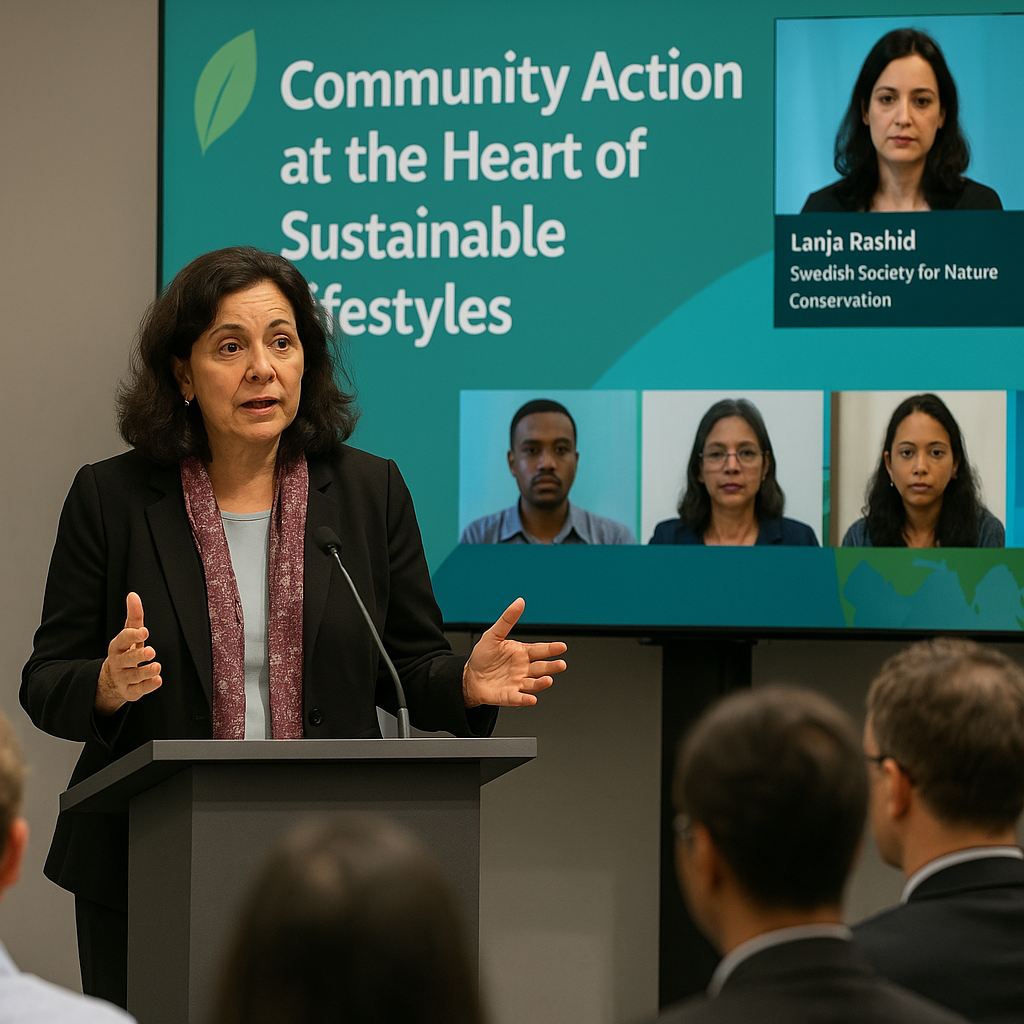Grassroots Power: Communities Lead Way in Sustainable Living at Global Summit
Over 1,200 participants from around the world gathered at the Sustainable Lifestyles Summit to explore how community-led solutions and people-centered economies are key to achieving a just and sustainable future.

Consumers International hosted a landmark event during the week of March 10, 2025—the Sustainable Lifestyles Summit—which placed consumers and communities at the heart of global conversations on building sustainable lifestyles. Timed to coincide with World Consumer Rights Day on March 15, the fully virtual summit brought together more than 1,200 participants and 85 expert speakers over five days and 18 engaging sessions, creating a platform for global collaboration and exchange of ideas.
Spotlight on Sustainable Living: Questions That Matter
The summit asked pressing questions that many communities and governments around the world are grappling with:
-
How can sustainable living become an easy and accessible choice for all?
-
What kinds of policies, innovations, and movements can actually drive systemic change?
-
Who is already leading the way—and what can we learn from them?
From policy shapers to grassroots innovators, the event featured diverse voices united by a shared purpose: building a just transition to a future where sustainable lifestyles are the norm, not the exception.
Day Five Highlight: Community Action at the Heart of Change
One of the most impactful sessions of the summit, held on March 14, was titled “Community Action at the Heart of Sustainable Lifestyles.” This session focused on showcasing real-world, community-led solutions that are not only feasible but are already delivering results on the ground.
Moderated by Lanja Rashid from the Swedish Society for Nature Conservation (SSNC), the discussion highlighted how sustainability doesn’t have to start at the top—it can, and often does, start with empowered communities.
The opening address was delivered by Simel Esim, Head of the Cooperative, Social and Solidarity Economy (COOP/SSE) Unit at the International Labour Organization (ILO), and Chair of the UN Inter-Agency Task Force on Social and Solidarity Economy (UNTFSSE). Her powerful message set the tone for the session: “Sustainable alternatives are not just possible—they are already happening, led by communities who prioritize people and planet over profit.”
Social and Solidarity Economy (SSE): A Model for the Future
Simel Esim underscored the importance of the Social and Solidarity Economy (SSE) as a transformative approach to achieving a just transition. SSE entities—including cooperatives, mutuals, associations, and social enterprises—function on principles of equity, sustainability, democratic governance, and solidarity.
She illustrated the wide-reaching impact of SSE actors through global examples:
-
Renewable energy cooperatives in Denmark and Germany
-
Waste picker cooperatives in Brazil and India
-
Agroforestry groups in the Philippines
These initiatives are tackling climate adaptation and mitigation head-on, while ensuring that local people are empowered and included in the transition.
Esim also emphasized the crucial role of consumer cooperatives in reshaping supply chains and supporting sustainable consumption. She spotlighted the Savannah Project—a trade initiative between Coop Denmark and Kenyan coffee producer cooperatives—as an example of how cooperative-to-cooperative trade is advancing fair, sustainable economic relationships.
In an interactive moment, participants were asked if their organizations identified as part of the SSE. A clear majority responded affirmatively—affirming the growing recognition of SSE as a vital pathway toward sustainability.
Green Action Week: Groundbreaking Community Solutions from Four Continents
The session also spotlighted four innovative, community-based initiatives that participated in this year’s Green Action Week—a global campaign driven by Consumers International and SSNC, celebrated in over 30 countries.
Each of the four initiatives, from Indonesia, Cabo Verde, Costa Rica, and Bangladesh, shared their own grassroots responses to pressing challenges such as:
-
Plastic pollution and water scarcity
-
Dependence on imported food and the decline in nutritional health
-
Climate change and its influence on consumer choices
-
Food waste and community-based redistribution systems
These projects are redefining what it means to live sustainably, using limited resources creatively and fostering solidarity-based responses to environmental and social challenges.
A Just Transition Through Community Resilience
Across the session, a common thread emerged: sustainability thrives when communities lead. From reshaping food systems to advancing circular economy practices, community-driven action is not only possible—it’s already happening, and it’s effective.
Participants left the session with a renewed sense of what’s achievable when people are put first. The SSE framework and Green Action Week examples showed that collective purchasing, resource-sharing, local resilience, and community empowerment are key tools in building a sustainable future that leaves no one behind.
Final Reflections
The Sustainable Lifestyles Summit affirmed that consumers aren’t just part of the system—they are powerful agents of change. With community-led models like the Social and Solidarity Economy gaining traction, and grassroots movements proving that local action has global impact, the path to sustainable living is becoming clearer.
As the world celebrated World Consumer Rights Day, the summit reminded us that protecting consumer rights must go hand-in-hand with promoting sustainable, inclusive lifestyles—for the planet, and for generations to come.
- READ MORE ON:
- Sustainable Lifestyles Summit










